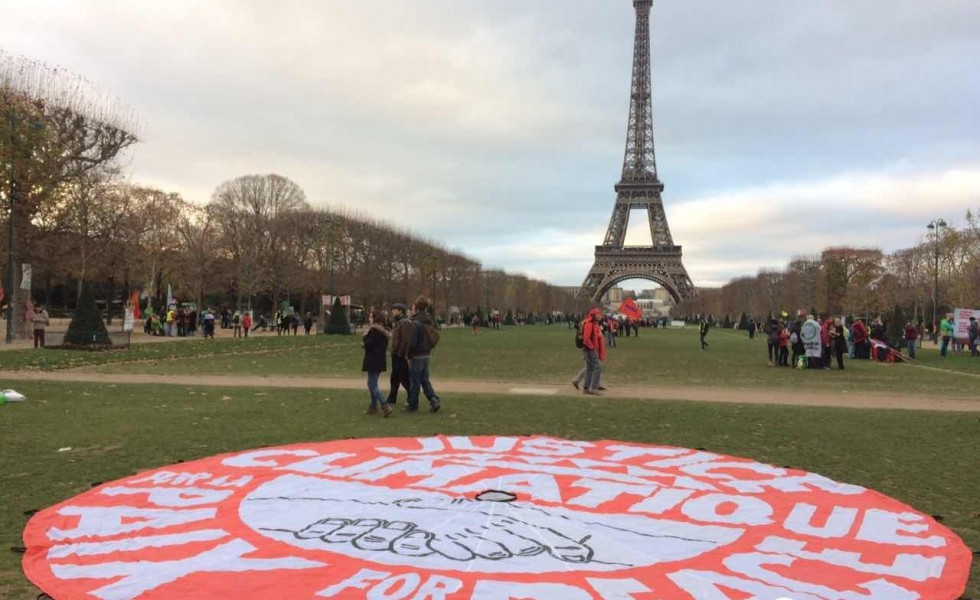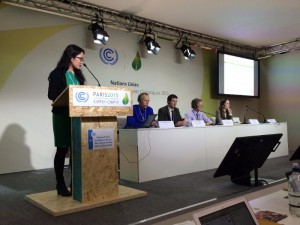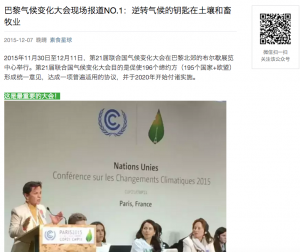
Animal Farming and Planet Health at COP21

A grande view of the Eiffel Tower at the civil society rally on the last day of COP21.
This blog is part of Wanqing Zhou’s longer report on her work at COP21 in Paris, France in December 2015. To read that longer blog entry, click here.
Brighter Green’s side events took place in the second week, when the number of other side events related to meat production and consumption also increased. These stimulated the discussion on animal farming and its impacts on climate change, environmental pollution, food security, and public health. Experience of dietary change was also a hot topic, with philosophical reflection on the widespread overconsumption of meat and in general, on the differences between typical western and eastern views of nature and health, and on whether meat, eggs, and dairy should be categorized as foods at all.
It is not clear how many people in the group are already following a vegetarian or vegan diet, but among those who actively participated in the discussion, at least half were not. However, based on the discussion, consensus was that a plant-based diet is better for the health of people and the environment.
This perspective is also reflected in the comments under “COP21 Side Events Call for Less Meat Consumption and Less Emissions”, an article by Ling Wang and published on Caixin.com. Among a dozen comments, more than half supported the idea of eating less meat. Examples include:
“This is not a joke. It is actually the same as calling for green transport and energy saving,”
“We indeed need to reduce meat intake,”
“A plant-based diet is better for the environment,” and
“Zero meat consumption is also doable.”
Hongqiao Liu from the Earth Journalism Network also reported on the Brighter Green side event, as well as the neglected issue of meat in the climate negotiations.
The role of regenerative grazing was brought up by some WeChat group participants who followed this method in their research. It was agreed that although regenerative grazing, when done correctly, can help restore ecosystems and sink organic carbon into the soil, more research is needed to study the effectiveness of this practice in different areas, and better farm-level measurement is needed to show the net climate impact on commercial stocking rates, before it is used to encourage the consumption of “carbon-sink meats”.
This is especially true in developed countries like the U.S., where per capita meat consumption has already exceeded threefold a level that poses serious threats to human health. At the same time, as shown in the WeChat group discussion, an increasing number of people in China, where the per capita meat consumption is 50% lower than that in the U.S., are waking up to the fact that the human body doesn’t require animal-based foods to be healthy.
On December 7, excerpts from the first week of group discussion were edited into a WeChat article and posted on VegPlanet, the largest vegan online platform in China, and reached nearly 1800 readers. It is encouraging to see the general public becoming increasingly concerned about the problems of livestock production and overconsumption, and sharing their opinions openly using information technologies to benefit more people. One year after we launched the WeChat Monthly Global Dialogue, our readership and volunteer group continues to grow, and we are seeing richer involvement in the discussion. Looking forward, activities like this are leading towards not only raised awareness, but also real actions for a more sustainable food system.
Photo Credit: Wanqing Zhou
 Brighter Green
Brighter Green






